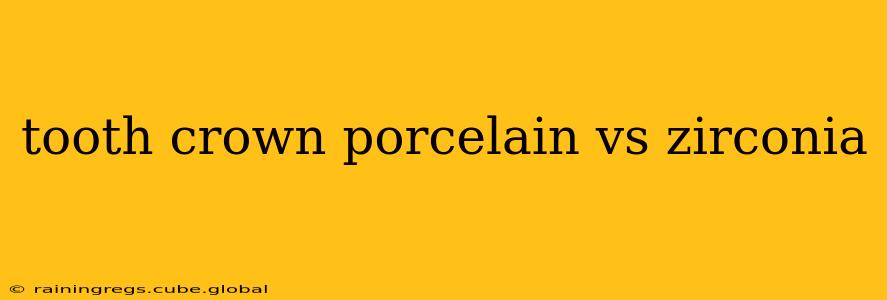Dental crowns are a common restorative procedure used to protect and strengthen damaged teeth. When it comes to choosing the material for your crown, two popular options stand out: porcelain and zirconia. Both offer excellent durability and aesthetics, but they have distinct characteristics that make them suitable for different situations. This comprehensive guide will help you understand the key differences between porcelain and zirconia crowns, empowering you to make an informed decision in consultation with your dentist.
What is a Porcelain Crown?
Porcelain crowns are known for their exceptional aesthetic qualities. They can be meticulously crafted to precisely match the color and translucency of your natural teeth, resulting in a highly natural-looking restoration. The material itself is relatively strong, making it a suitable option for many applications.
What is a Zirconia Crown?
Zirconia crowns are renowned for their superior strength and durability. They are significantly stronger than porcelain crowns, making them ideal for teeth that bear significant forces, such as molars. While not as naturally translucent as porcelain, advancements in zirconia technology have significantly improved its aesthetic appeal, allowing for crowns that blend seamlessly with surrounding teeth.
Porcelain Crown Pros and Cons
Pros:
- Excellent Aesthetics: Porcelain crowns closely mimic the natural appearance of teeth, offering a highly lifelike restoration.
- Natural Translucency: Porcelain allows light to pass through in a way that closely resembles natural tooth structure.
- Versatile: Porcelain can be used for both anterior (front) and posterior (back) teeth, though it may be less suitable for high-stress areas.
Cons:
- Lower Strength and Durability: Compared to zirconia, porcelain crowns are more susceptible to chipping or fracturing, particularly in areas subjected to significant biting forces.
- Potential for Staining: Porcelain crowns can be stained over time, especially with regular consumption of coffee, tea, or red wine.
- May require more frequent replacements: Due to their lower durability, porcelain crowns may need replacing sooner than zirconia crowns.
Zirconia Crown Pros and Cons
Pros:
- Exceptional Strength and Durability: Zirconia crowns are significantly stronger than porcelain crowns, making them ideal for molars and other teeth under high stress.
- Long-lasting: Their durability contributes to a longer lifespan compared to porcelain crowns.
- Biocompatible: Zirconia is generally well-tolerated by the body, minimizing the risk of allergic reactions.
- Improved Aesthetics: Modern zirconia crowns offer excellent aesthetics, though they might not match the translucency of high-end porcelain.
Cons:
- Higher Cost: Zirconia crowns are generally more expensive than porcelain crowns.
- Less Natural Appearance (Historically): While significantly improved, zirconia might not perfectly mimic the natural translucency of teeth, although this is becoming less of a concern with advancements in the material and manufacturing techniques.
Which Crown Material is Right for Me?
The best material for your dental crown depends on several factors, including:
- Location of the tooth: For teeth under high stress (molars), zirconia is often preferred. For front teeth where aesthetics are paramount, porcelain might be a better choice.
- Bite force: Patients with a strong bite might benefit from the increased durability of zirconia.
- Budget: Zirconia crowns typically cost more.
- Overall dental health: Your dentist will assess your overall oral health and individual needs to determine the best option.
It's crucial to consult with your dentist to discuss which type of crown is best suited for your specific needs and circumstances. They can evaluate your oral health, consider your lifestyle, and help you make an informed decision.
What are the Alternatives to Porcelain and Zirconia Crowns?
While porcelain and zirconia are the most prevalent materials, other options exist, including gold crowns and metal-porcelain crowns (PFM). Each material has its own set of advantages and disadvantages, and the best choice depends on the individual's needs and preferences. Your dentist can provide more information on these alternative options.
How Long Do Porcelain and Zirconia Crowns Last?
With proper care, both porcelain and zirconia crowns can last for many years. However, zirconia crowns generally have a longer lifespan due to their superior durability. The longevity of any crown also depends on factors such as oral hygiene, diet, and the overall health of the patient.
How Much Do Porcelain and Zirconia Crowns Cost?
The cost of dental crowns varies depending on several factors, including the location of the dental practice, the type of crown, and the complexity of the procedure. Generally, zirconia crowns are more expensive than porcelain crowns. It's best to contact your dentist or local dental practices for specific pricing information in your area.
This information is for general knowledge and does not constitute medical advice. Always consult with a qualified dental professional for diagnosis and treatment planning.
